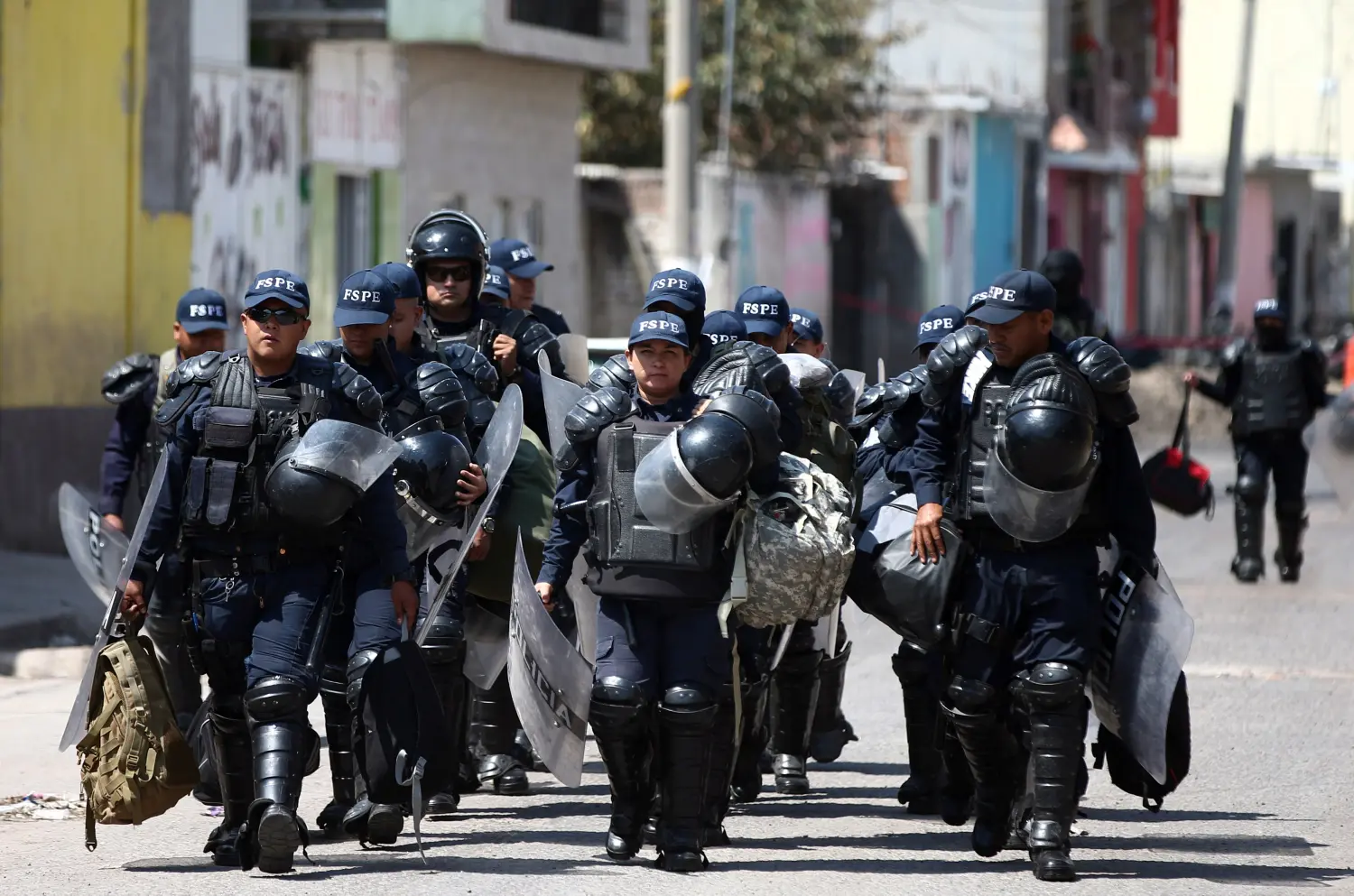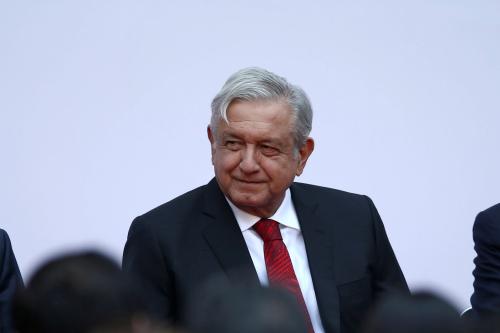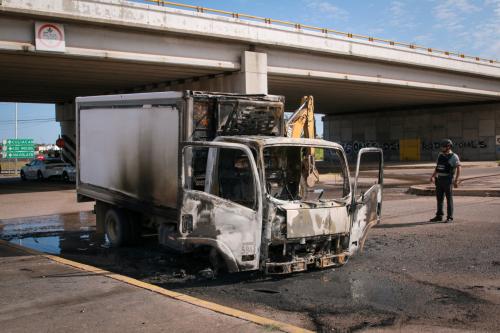Executive Summary
- Improving public safety, especially reducing Mexico’s soaring murder rate, is the toughest challenge of Mexico’s new president, Andrés Manuel López Obrador (known as AMLO).
- In November 2018, AMLO unveiled his National Peace and Security Plan 2018-2024, describing it as predominantly focused on the roots of insecurity, as opposed to confronting drug trafficking organizations (DTOs). The plan combines anti-corruption measures; economic policies; enhanced human rights protections; ethics reforms; public health, including treatment for drug use and exploration of drug legalization; transitional justice and amnesty for some criminals; and broader peacebuilding, to include traditional anti-crime measures such as prison reform and security sector reform, plus a new law enforcement force, the National Guard.
- Various elements of his announced new security strategy—such as the formation of the National Guard—remain questionable and unclear and are unlikely to reduce violence quickly.
- AMLO’s proffered security strategy will likely create friction with the United States. Jointly countering fentanyl smuggling, however, could provide one venue of U.S.-Mexico cooperation.
Corruption and Mexico’s justice system
- Combatting corruption is a foundational element of AMLO’s security policy, and his administration has adopted a wide set of anti-corruption measures, including highly controversial and questionable ones.
- However, AMLO has yet to appoint a dedicated anti-corruption prosecutor, make appointments to the National Anti-Corruption System, and support the 2016 National Anti-Corruption System reform.
- AMLO has not broken with politically powerful and immensely corrupt unions, proposing instead to reverse reforms and lay off 70 percent of non-unionized federal workers.
- It remains unclear whether AMLO will empower Mexico’s civil society—crucial for reducing corruption—or continually define it as his antagonist.
- AMLO’s administration has not yet focused sufficiently on implementing the judicial reform by properly implementing the new prosecutorial system.
- The administration has emphasized minimizing salary differences between public ministries, federal judges, prosecutors, and police officials. The weakness of prosecutors and their lack of cooperation with law enforcement and judges have been key stumbling blocks, keeping prosecution rates abysmally low. However, minimizing salary differences is inadequate.
- Deleteriously, AMLO has refused to allow the independent selection of an autonomous attorney general.
Focus on brutal crimes instead of drug trafficking groups and rejection of high-value targeting
- The AMLO administration suspended focus on DTOs, drug trafficking, and high-value targeting of DTO leaders. Instead, it prioritizes “brutal crimes.” But that strategy ignores the fact that key perpetrators of homicides, extortion, and robberies are DTOs.
- Large law enforcement deployments to Tijuana and efforts to combat fuel theft have been interpreted by DTOs as direct confrontation. Instead, AMLO should prioritize targeting the most violent criminal groups, while deterring new outbreaks of violence.
- The target should be the middle operational layer of a criminal group, seeking to disable the vast majority of the middle layer in one sweep, in order to reduce the group’s regeneration capacity.
- The Mexican government remains challenged in implementing such a policy by the continual lack of strategic and tactical intelligence in an ever more fragmented, multipolar, and opaque criminal market, and by the continual corruption of Mexico’s law enforcement apparatus.
The National Guard
- AMLO has not stopped using the Mexican military for domestic law enforcement. However, he has created a new structure combining military forces with Federal Police forces—The National Guard.
- To be completed in three years, the National Guard is to be 150,000-strong. Sent initially to 17 areas with high homicide rates, the first contingent of 50,000 is to start functioning by April 2019. The head of the National Guard is a civilian, but much of the leadership is military.
- Mexico is to be divided into 266 regions, each with a National Guard contingent for preventing crime, arresting suspects, and acquiring evidence. However, the logic of how the regions will be drawn and of the National Guard force deployments remains opaque.
- Also, it is unclear how specifically it should accomplish those objectives, gather intelligence, cooperate with state and local police and military units, and build trust with local communities.
- The National Guard is highly symptomatic of Mexican administrations’ standard approach to public safety—namely, to create new institutions, rename old ones, and hire Mexico’s military personnel into civil law enforcement roles.
- While decrying the continual corruption of Mexico’s police forces, the AMLO administration has said little about strengthening police reform, beyond increasing wages of some police officers. However, police reform, particularly of local police forces, remains a fundamental need of Mexico’s rule of law.
Amnesty for crimes
- A proposed amnesty law for certain crimes still remains underspecified but has profound implications for rule of law in Mexico, including a complex tangle of moral, legal, victims’ rights, and rule of law dilemmas.
- The policy is to combine justice, truth, and reparations to victims, providing leniency or even full amnesty to some criminals and potentially entire criminal groups. Such an expansion could profoundly undermine rule of law in Mexico and weaken deterrence capacity of Mexico’s justice system.
- But even the existing conceptualization of individual amnesty design is problematic.
- Critically, when transitional justice is employed in post-conflict settings, there is a presumption that violent conflict and human rights violations will not be repeated. But Mexico will continue to face violent criminality for years.
Prison reform
- The Felipe Calderón administration focused prison reform principally on building more prisons, but kept flooding them with new prisoners. The Enrique Peña Nieto administration increased government authority over prisons, including through international accreditation. The AMLO administration now needs to combine these improvements with better protection of prisoners’ human rights.
Socio-economic policies to combat crime
- Consistent with AMLO’s emphasis on reducing inequality, socio-economic policies to combat crime are billed as a dominant component of his security strategy.
- Well-designed and implemented socio-economic efforts sustained over a long time are vital. However, it is not yet evident what such programs will look like. It is problematic to assume that general socio-economic policies will produce robust anti-crime effects.
- Individuals who receive amnesty should be prime beneficiaries in order to reduce recidivism, but victims and their communities should receive benefits as well.
- The AMLO administration should anticipate difficulties with funding, legal job creation, the integration of the anti-crime socio-economic efforts, and local policing, and avoid the pitfall of labeling all anti-poverty efforts as anti-crime measures.
Marijuana legalization, poppy licensing, and public health
- Arguing that drug prohibition is a key driver of violence in Mexico, the AMLO administration is exploring legalizing marijuana production, sales, and consumption and licensing the cultivation of poppy for the production of medical opiates.
- The administration has requested that the United States re-allocate its budget for anti-crime programs in Mexico toward drug treatment.
- With rural farmers a key constituent, the AMLO administration wants to reduce the intensity of illicit crop eradication, risking friction with the Trump administration. Opium poppy cultivation in Mexico shot up a result of the U.S. opioid epidemic.
- Prior eradication efforts failed to reduce drug crops sustainably and often exacerbated the insecurity of marginalized populations, intensified violence, and increased the political capital of criminal groups.
- The AMLO administration’s focus on providing alternative livelihoods is a positive development. But the AMLO administration’s approach to legal livelihoods, centering on price support for legal crops, warrants skepticism. Price profitability is not the most important factor influencing farmers’ cropping decisions.
- Poppy licensing is complex, and its effects on violence and rural development are highly contingent. For a licensing scheme to be consistent with the international counternarcotics regime, two difficult issues have to be addressed: preventing licensed opium from being diverted into the illegal trade and overcoming the insufficient demand for legal Mexican opioids.
- Marijuana decriminalization and the legalization of poppy for medical purposes will not defund criminal groups, as without the rule of law, they can easily tax legal cultivation, just as they extort other legal economies.
- If Mexico wants to legalize drugs in a way that reduces violence and criminality, it must first deliver effective rule of law to areas of production and beyond, by building effective law enforcement and justice deterrence.
Militias
- The AMLO administration has remained largely silent on the difficult and dangerous issues of the persistence of self-defense forces, in fact militias, which undermine Mexico’s rule of law.
- Some militia members may qualify for amnesty. Others may persist in violent criminal activity and the AMLO administration will need to confront them with law enforcement and punitive measures, which may not be politically palatable.
Human rights and moral constitution
- AMLO promised to center his national security strategy around human rights protection and avoiding the egregious human rights violations perpetrated by state forces under previous administrations, such as by criminalizing government neglect of recommendations issued by the National Human Rights Commission or state- level human rights commissions and searching for Mexico’s 40,000 missing people.
- In addition to upholding this promise, he also needs to define protection from militias as a human right.
- Moreover, in the context of widespread impunity, absolving crimes such as not paying for water or electricity (previously advocated by AMLO) set a bad precedent for effective regulatory management and contrasts with his promotion of a new moral constitution in Mexico, a set of ethical standards to be embraced by government officials, businesses, and society.
Recommendations
- The AMLO administration should focus on: Making interdiction more strategic, instead of giving up on it;
- Prioritizing targeting of the most violent and aggressive groups, such as Cartel de Jalisco Nueva Generación, rather than dropping focus its on DTOs;
- Prioritizing suppression of fentanyl smuggling and collaborating with the United States on reducing fentanyl flows;
- Switching to middle-layer targeting of violent criminal groups;
- Maintaining law enforcement focus on areas where violence has declined;
- Developing a gradual concentric circles strategy to transition away from policing by the military;
- Resurrecting momentum on police reform, especially of local police forces;
- Strengthening justice reform, particularly enhancing prosecutorial capacities and coordination among law enforcement, prosecutors, and judges;
- Improving the logic and integration of anti-crime socio-economic approaches with law enforcement, replacing limited handouts with transformative projects, even if that requires the concentration of resources and only gradual and long-term coverage throughout the country;
- Emphasizing human rights and accountability, including by taking on the militias;
- Refining the proposed amnesty law and avoiding designs that strengthen impunity; and
- Reinforcing the state’s territorial control and legitimacy.
The Brookings Institution is committed to quality, independence, and impact.
We are supported by a diverse array of funders. In line with our values and policies, each Brookings publication represents the sole views of its author(s).





